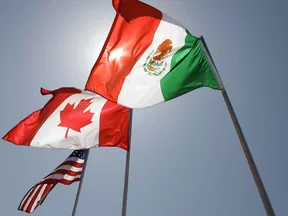Opinion: We shouldn’t forget Mexico can be a key ally when it comes to dealing with the Americans
Article content
Ontario Premier Doug Ford’s call last week for a bilateral trade deal with the United States is dangerous, but easy to understand.
There is need for public discussion of Mexico’s role in the North American trade pact, especially with respect to the transshipment of Chinese goods and the threat that might pose to Canada’s emerging electric vehicle sector.
While there is merit in the discussion, there is also merit in being wary of acting too hastily.
Advertisement 2
Article content
The Canada-Mexico relationship has, at times, been difficult and frustrating. Donald Trump’s return, with his antipathy towards Mexico on a range of issues, brings added impetus to reconsider the benefits of a three-way pact.
But walking away from Mexico is to walk into Trump’s favourite negotiating trap of “divide and conquer.”
Canada learned this painful lesson during the negotiations that led to the current North American trade agreement.
During those talks, many in Canada were happy to see one-on-one negotiations with the Americans replace earlier three-way talks.
At the time, there was a belief, not entirely unfounded, that Mexico was the problem child in the relationship, and that Canada would have an easier time negotiating directly with the U.S.
This misplaced belief came back to bite Canada in August 2018, when, during the heat of negotiations, Canadians awoke to the following headline: “Trump announces U.S.-Mexico trade deal to replace NAFTA, and says ‘we will see’ if Canada can join.’”
It appeared that Mexico was not the problem child, but the favoured one, and that it was Canada that had been thrown under the bus.
Article content
Advertisement 3
Article content
What was not reported in those stories or subsequently was that Mexican and Canadian negotiators had been in close contact for months prior to that moment, with face-to-face meetings where the substance of what Mexico was discussing with the U.S. was shared so that Canada could better prepare to engage the Americans.
Mexico, which had been a problem during parts of the negotiations, became a desperately needed ally at a crucial time, helping Canada avoid Trump’s threat to cut us out of the final deal.
Mexico is often a headache for Canada on one issue but a much-needed friend on another.
For example, in the upcoming review of the agreement, we will fight against Mexico on its ban of genetically modified corn but with them on country of origin labelling when it comes to allowing access to U.S. markets for Canadian and Mexican beef.
On balance, at the end of the day, all of Canada benefits from working with Mexico when the full range of issues is laid on the table. With a reinvigorated, more aggressive Trump administration, Canada will need all the friends — and even frenemies — it can get.
Advertisement 4
Article content
How much of a friend the newly elected Mexican government will be is an open question, but slamming the door shut before we have a clear answer is not a smart strategy.
When it comes to the transshipment of goods from China into the North American market, Mexico’s new government has made clear that it is not only aware of the problem but is acting. That transshipment is taking place is not a surprise. Give private sector actors an opportunity to profit, and they will. In a developing country like Mexico — and we often forget it still falls in this category — it is an even bigger problem since foreign investment and associated jobs are more desperately needed for poverty alleviation.
The point is that Mexico is aware of the problem and is seeking to address it. Should they succeed, we will have angered a potential ally for naught.
Recommended from Editorial
Trump’s trade policy as developed by think tanks associated with the incoming administration is explicitly and openly designed to move manufacturing jobs from foreign companies to the U.S. That includes moving jobs from Canada — and Ontario — south across the border.
When the Trump administration comes for manufacturing jobs in Ontario beyond autos, the province and premier will be looking to the east and west for help — maybe even as far south as Mexico.
Carlo Dade is the Director of the Trade and Trade Infrastructure Centre at the Canada West Foundation. He is also a member of the Mexican Council on Foreign Relations.
Article content
